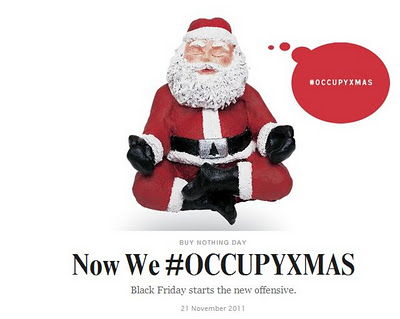Last week, on the second day of Advent, a message arrived in my inbox from the headmaster of the Catholic prep school that my daughter attends. It was addressed to parents—a reminder, appropriately, of the importance of accenting the spiritual and the liturgical during a season otherwise given to shopping. But what reeled me in was the headmaster’s instant acknowledgment that complaining about the commercialization of Christmas is “a cliché.” It’s hard to do that, he admitted, without seeming “preachy or strident.”
A year ago, I encountered a similar self-consciousness in a discussion circle made up of graduate students at Boston College. Roughly a dozen of them turn out once a month for a spirited student-led conversation about faith and society. Last year, four days after Black Friday and one day after Cyber Monday, they came together at the graduate student union building to consider consumerism.
Squeezing into billowy sofas and chairs around a coffee table blanketed with pizza boxes, the students listened as one of their own, a young man sporting several earrings, made an ambiguous statement. “Advent is about waiting for a gift to come rather than seeking [acquisition] on Cyber Monday,” he said at the start of his presentation, adding—“although there were some sweet DVD deals yesterday.” Members of the circle, helping themselves to portions of pizza with seemingly every known topping, chuckled at the intended irony.
Many thoughtful people feel a need to almost apologize or assume a somewhat ironic pose when warning of material excess, especially at Christmas time. This is not just understandable. It’s refreshing, given how the discussion of consumerism seems to perennially devolve into handwringing and dour pontification. The headmaster and the grad students realize that people are tuning out the crankier critiques of consumerism. And that’s partly because people are consumers, although that’s not all they are. Most of us hunt for values, in both the retail and moral senses of that word.
The Gnostic Temptation
Theologically speaking, the human person is a composite of body and soul—of the material and the spiritual. An alternative theology is encapsulated in Gnosticism, which sees the material world, instead, as evil or illusory; only the spiritual universe is real. Hence, the Gnostics, who proliferated in the first few centuries after Christ, believed that Jesus was somehow a purely incorporeal being. The Word was never made flesh.
Today, much anti-consumerist rhetoric seems to slouch toward Gnosticism. This school of mysticism has its secular adherents: Many of them apparently congregate around AdBusters, a Canadian-based anti-consumerist movement founded in 1989. This year, the organization is running a campaign, #OccupyXmas, in which activists hold Santa sit-ins at shopping malls and bid customers to scissor their credit cards. Some anti-consumerists are reportedly filling up carts with items and then leaving them at the checkout line.
“Christmas has been hijacked for us,” Adbusters magazine editor Kalle Lasn recently told the Toronto Star, explaining the call for such antics. “It’s become this ugly, soulless, consumer fest.” #OccupyXmas was launched on Black Friday this year, on the magazine’s 20th annual Buy Nothing Day.
If the material world is to be deeply distrusted, then all this makes undeniable sense. And it becomes useless to ask questions like how to better integrate our bodies and souls, our buying and our being—because the immaterial is all that counts. But on some level, these are the questions many people ask. How do I consume without being consumed by the desire for more stuff? What sorts of things bring real value into my life?
A Consumerist Test
One of the best ethical guides through the consumer jungle was and remains John Kavanaugh’s 1981 classic Following Christ in a Consumer Society (updated in 1991). Kavanaugh, a Jesuit priest, philosopher, and columnist for America magazine, is no apologist of consumerism. He worries, rightly, that consumerist values have undercut other values of life, such as family, friendship, intimacy, nature, simplicity, and service to others.
“If we have to spend more time working, more time buying, more time relating to our products, that’s good for capitalism, but it’s not necessarily good for the quality of our relationships,” he told me a few years ago.
All the same, Kavanaugh echoes the traditional Judeo-Christian understanding that material goods are, well, good. Especially when they’re used thoughtfully and with moral purpose. With that in mind, Kavanaugh says the real test of a consumer acquisition is whether it deepens our relationships. For example, a Wii in the living room or a swimming pool in the back yard can enhance human life by drawing together families and neighbors.
Here we have a non-dualistic view of spirit and matter, and it’s of a piece with the distinctive theology of the Christmas season: the Incarnation. By that doctrinal light, Jesus was not, as the Gnostics would have it, a discarnate being.
William S. Stafford puts it nicely in an article running in the current issue of Sewanee Theological Review, titled “Advent’s Mad Rush and the One Thing Needful.” Stafford, an Episcopal priest, based the article on a sermon he delivered two Advents ago, in which he declared: “We are here to await the coming of a person in whom material concreteness and divine mystery are one and the same.” Sounds like a pretty good description of human as well as divine nature.







Perhaps it is age speaking but as I read I realised that in the few years since I retired relationships have become more important/meaningful in my life. I have time to develop them, to think about them and to value them.
I think God gives us time to work on our relationships not just with friends and family but with Him, to help us see and grasp our dependence on our community and ultimately on Him.